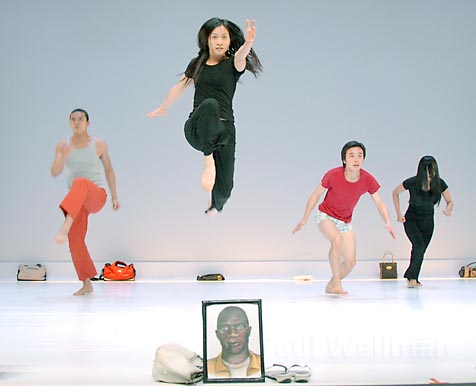Drought and Rain Vol. 2, presented by Company Ea Sola.
At UCSB's Campbell Hall, Wednesday, January 30.

During the question-and-answer session following the performance of Drought and Rain Vol. 2, one audience member asked Vietnamese choreographer Ea Sola, “How do you create a dance about something abstract and keep us engaged for more than an hour?” “I don’t know,” she replied. Approaching the subjects of memory and modernity through the lens of war does not lend itself to easy explanation.
Drought and Rain Vol. 2 is Ea Sola’s fifth dance production that reflects on war. Now, more than one generation after the Vietnam War she herself lived through, much of the memories of that era are passed on virtually, through text, photographs, television, and film. Similarly, the war being waged in Iraq today is, for most people, an abstract event-one we witness virtually rather than directly. In her latest work, Sola questions the impacts of experiencing war only in the abstract, and whether such an experience can “trigger an act of conscience,” especially in young people.
Bridging memory and modernity, the past and the present, the surreal and the real, Sola revealed the interconnectedness of them all in a sparse, emotionally charged production. Nine dancers from the Vietnam National Opera Ballet, four musicians, and one singer periodically took the stage. Also present were eight framed portraits of various war victims from the last 10 years. Despite the well-populated stage, the production was minimal, seemingly stripped of sound and movement. As in a view of the open desert or an empty expanse of sea, there didn’t appear to be much happening on the surface, yet the richness of the landscape reverberated somewhere deep. Sometimes the dancers tiptoed among one another, silent and ghostly. In other moments, the musicians pounded their drums while the dancers attacked the space with flailing limbs and hair and threatening gestures.
Memory is a slippery thing-a single moment witnessed by many will be remembered differently by each person. So it is with war, and so it is with any performance. The message of this production wasn’t logical-there was no moral lesson or singular narrative. It was more like a punch in the stomach. Yet my memories and the images I am left with are real and lasting. Maybe something as “unreal” as a memory can be passed on, even to those who never witness an event directly. It could exist as something as subtle as a fleeting mood; an urge to cry without knowing why.



